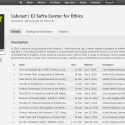making local government more ethical
Popular content
Last viewed:
- Nonviolence and Government Ethics VI – Integrative Power
- Free & open source tools for ethics practitioners
- Clean Water and Clean Hands
- Standards of Proof in Ethics Enforcement
- The Kingdom of Individuals III: Obligations to the Community and to the Organization
- Pay-to-Play Scandal Takes Out Bill Richardson
- Hubris, Nemesis, and Government Ethics
- A Classic Example of a Closed Fiefdom
Recent blog posts
- Barriers to Civic Engagement -- a TED Talk from Dave Meslin
- Larry Lessig's 7 minute plenary speech at the #UNRIG conference in New Orleans
- Charleston Post Courier Article
- A new way to influence elections without transparency
- Congratulations to Robert Wechsler on his retirement!
- City Ethics' Director of Research Announces Retirement
- Appearance Is All We Have
- Announcing the Book "The Regulation of Local Lobbying"
- Efforts to Influence Through the News Media as Lobbying
- Gifts of Sexual Relations

